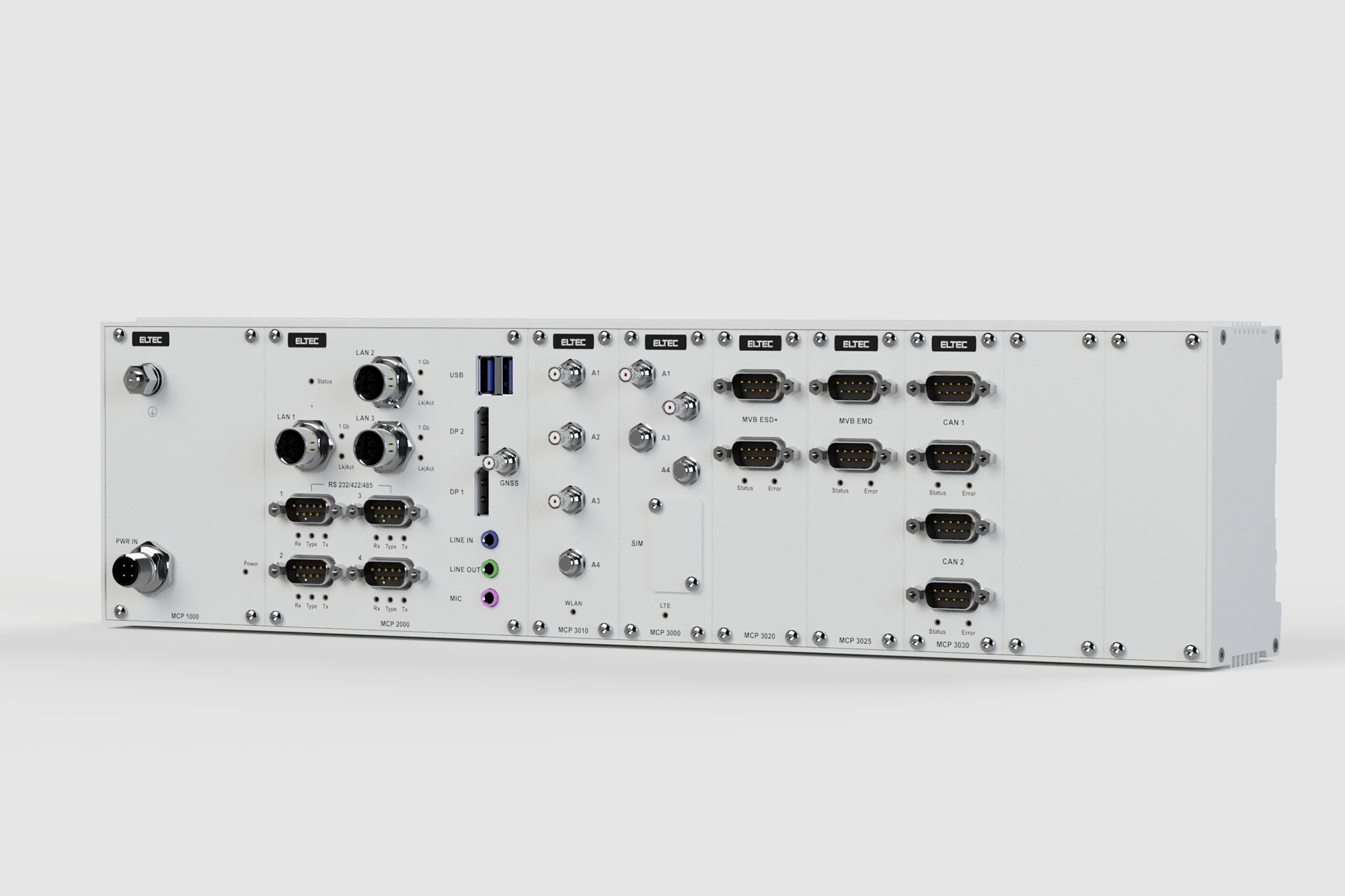
Modular Computing Platform - individually configurable, compact and standardized according to ModBlox7

21.06.2022
Mainz – June 21, 2022 – ELTEC Elektronik, a business unit of Westermo and part of the Swedish BEIJER GROUP, has launched the PCEye MC-R, a robust, modular computing platform with various CPU options for scaling performance. The PCEye MC-R is an individually configurable BoxPC suitable for railway applications in a very compact design with interfaces for Gigabit Ethernet, RS232/422/485, DisplayPort, USB 3.0 and audio in the basic version. Thanks to its modular design, the basic system can be extended with up to seven interface, communication or mass storage modules. In addition, the dedicated housing concept enables a variety of mounting options, from DIN rail to 19" rackmount.
The PCEye MC-R has been developed in compliance with the railway standard EN 50155 (IEC 60571), is maintenance-free and can be deployed in an operating temperature range from -40°C to +70°C. Train manufacturers, railway operators, integrators and many other industrial sectors where proprietary BoxPCs are currently used will benefit from the new computing platform, based on the open ModBlox7 standard.
Current BoxPCs are typically proprietary system solutions with little flexibility in terms of their equipment features and mounting options. In addition, only very few BoxPCs offer railway-compliant power supplies or railway-typical interfaces such as MVB or specific sensor interfaces. The ModBlox7 standard overcomes these disadvantages: It offers a modular system in which power supply units, CPU and I/O modules from different manufacturers can be combined in order to achieve tailor-made solutions for any application.
Another advantage: unlike other modular concepts, no separate backplane or system monitoring unit is required. This reduces the otherwise usual overhead costs and enables the construction of cost-effective computer solutions that can be expanded if necessary or flexibly adapted to changing needs.
Today, more than ever, an open standard is required for modern embedded systems that combines the advantages of previous system designs with those of BoxPCs. This requires a standardized form factor including suitable mounting options as well as clearly defined interfaces between the functional groups within the BoxPC.
This approach is also followed by the PICMG - a non-profit consortium of more than 130 member companies that are diversely specialized, driving embedded computing specifications such as the new PICMG form factor specification ModBlox7 and that implements open standards in many embedded computing applications. ELTEC has taken the lead in defining the new specification in a task force with 18 other companies.
For industrial end users, the advantages of an open BoxPC standard lie in the cost-efficient design of dedicated systems and the flexible interchangeability of components in order to adapt the platform to specific tasks. A high availability of the ready-to-use modules is guaranteed, and the customer only pays for what he needs for his application. Manufacturers also benefit from open standards, since the interoperability means that they do not have to develop every device including the embedded components themselves but can concentrate fully on their core competencies.
ELTEC and various partner companies are currently driving standardization within the PICMG to enable cross-vendor compatibility and interoperability. The PCEye MC-R platform is a first result of this initiative - a modular, scalable and individually configurable system with integrated GNSS functionality for customized embedded edge computing in many challenging areas, such as the railway sector. Typical applications include predictive maintenance, voice communication, passenger infotainment, ticketing systems, IoT gateways, diagnostic systems, edge computing and data-based cloud services.
The fanless, maintenance-free design of the PCEye MC-R offers various mounting options, such as DIN rail, wall or 19" rack or sub-rack mounting, for flexible integration in trains, buses or control cabinets. The system can be easily integrated into different environments with minimal space requirements. Due to the modular concept, various extension modules can be easily implemented to meet customer-specific requirements and functions. The extension modules are pre-assembled units that allow flexible configurations and ensure that the desired individual system is available within the shortest possible delivery time.
Typical radio extension modules include e.g. optional Wi-Fi modules, such as 3x3 MIMO 11ac, as well as LTE and predecessor modules. The number of modules can be flexibly configured depending on the power budget. The radio interfaces are 5G-ready and upgradable to 11ac Wave 2 as well as 11ax Wi-Fi 6 with integrated Bluetooth to increase network efficiency and maximize data throughput. Country-specific 5G/LTE/Wi-Fi standards are adopted for global deployment in all types of trains. Each 5G/LTE module can be equipped with up to four SIM cards to ensure optimal network coverage and maximum flexibility. The Wi-Fi interfaces enable client operation of the system, e.g. for predictive maintenance, as well as the connection of clients in access point operation with high data rates.
In the future there will be more modules that will then function as an open modular system. This makes it even easier to configure the modular computing platform for the respective application and to align the system to new requirements.
To expand the storage capacities of the PCEye MC-R with an internal memory, there is mounting space for an M.2 solid-state disk. The optional internal SSD memory can be upgraded from the standard 120 GB to up to 960 GB. It can be used for local, in-vehicle video and audio streaming or to store sensor data for predictive maintenance.
The PCEye MC-R offers a Linux-based open source operating system both for the realization of customer-specific applications and for the configuration of the Wi-Fi and 5G/LTE modules. In addition, the built-in Trusted Platform Module supports various security and encryption functions and ensures the security of the communication.
Daniela Linz
+49 6131 918 100
news@eltec.com